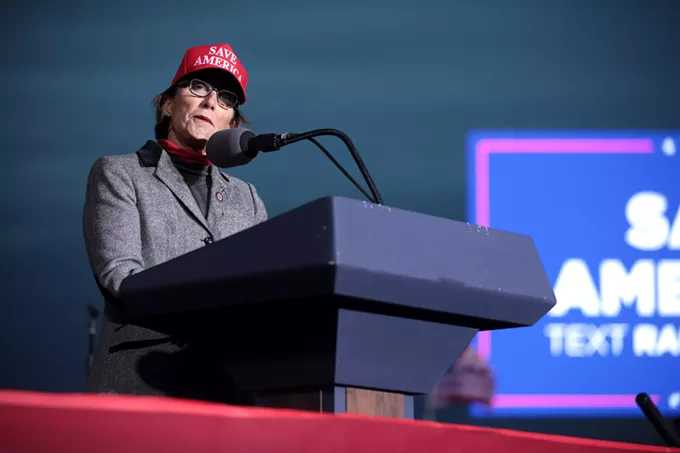Tuesday, March 1, 2022
Senate Votes To Censure Wendy Rogers For Threatening Her Colleagues
In the wake of her speech to a white nationalist conference and a string of offensive and inflammatory social media posts, the Arizona Senate voted to censure Republican Sen. Wendy Rogers.
The Senate voted 24-3 in a rare censure of one of its own, with 11 of the chamber’s 16 Republicans siding with the chamber’s 13 Democratic members who were in attendance. Rogers voted no, as did GOP Sens. Nancy Barto and Warren Petersen.
The censure, which has no practical effect, was for comments calling for people she perceived as enemies to be hanged from gallows, and for social media postings Rogers made threatening to “personally destroy” fellow Republicans who sought to punish her. The censure resolution was silent on her embrace of white nationalists and a string of antisemitic and racist things she had posted online in recent days.
Rogers, a Flagstaff Republican, didn’t defend or even address her comments on the Senate floor. Instead, she called the censure an attempt to limit her freedom of speech.
“I represent hundreds of thousands of people and the majority of them are with me. And they want me to be their voice. You are really censuring them. I do not apologize. I will not back down. And I am sorely disappointed in the leadership of this body for colluding with the Democrats to attempt to destroy my reputation,” Rogers said. “In the end, I rejoice in knowing I do and say what is right. And I speak as a free American, regardless of the actions of this corrupted process today.”
However, Senate President Karen Fann said the censure wasn’t about freedom of speech.
“We do support First Amendment freedom of speech. We absolutely support it. We fight battles over it. But what we do not condone is members threatening each other, to ruin each other, to incite violence, to call us communists. We don’t do that to each other,” said Fann, a Prescott Republican. “We, as elected officials, are held to a higher standard.”
Rogers spoke to the white nationalist America First Political Action Conference on Feb. 25. She called for gallows to be built so “high-level criminals” and “traitors who have betrayed our country” can be publicly hanged. She also unleashed a torrent of antisemitic tropes on social media over the weekend earlier this week, and voiced overt support for Russian President Vladimir Putin’s invasion of Ukraine.
After Senate Majority Leader Rick Gray publicly stated on Monday that discussions were underway about a possible censure, Rogers threatened retaliation against any GOP colleagues who joined the effort, writing on social media, “I will personally destroy the career of any Republican who partakes in the gaslighting of me simply because of the color of my skin or opinion about a war I don’t want to send our kids to die in.”
Rogers posted a draft version of the censure on social media, which showed that it was originally written to reprimand her for “inciting general racial and religious discrimination.” But that language was removed, as was a reference to her support of Putin.
Rogers spent a decade seeking office, first from Tempe and then from Flagstaff, before finally winning a state Senate race in 2020, ousting incumbent Sylvia Allen in the Republican primary. She ran for the Senate in 2010, then for Congress in each of the four subsequent elections, twice seeking the seat for the 9th Congressional District in the Phoenix area and twice running for the northern Arizona-based 1st Congressional district.
During her years on the campaign trail, Rogers earned a reputation as a hardline conservative. But after winning her 2020 race, she started taking more extremist positions. She has embraced far-right extremists and openly identified with the “groyper” movement that seeks to push the Republican Party toward white nationalism and make its extremist ideology more mainstream.
Rogers has become one of the legislature’s most vocal proponents of the false and debunked allegations that the 2020 presidential election was rigged against former President Donald Trump. She has made herself into a celebrity among Trump supporters across the country, raising $2.5 million for her re-election, a record for a legislative candidate in Arizona.
Last week, Gov. Doug Ducey drew national attention to the controversy surrounding Rogers when he told reporters that he still stood behind his decision to spend $500,000 from his political action committee to help elect her in 2020. Despite her embrace of white nationalism and inflammatory comments, Ducey said Rogers was still better than the Democrat she defeated, which kept the Senate in Republican hands with a one-vote majority.
The next night, Rogers spoke to AFPAC, which appears to have been the tipping point for many Republicans.
Rogers was nearly drawn out of her legislative district but was saved by a last-minute change by the Arizona Independent Redistricting Commission. Rogers’ Flagstaff home was initially going to be in the new District 6, which is majority Native American and overwhelmingly Democratic. The commission made a series of changes to move parts of Flagstaff out of the district at the behest of the tribes, which were concerned about being outvoted in Democratic primaries by white voters.
After what appeared to be the final changes, Republican Commissioner David Mehl proposed one more change that moved another portion of southern Flagstaff, including Rogers’ home, into heavily Republican District 7. Democratic Commissioner Shereen Lerner claimed Mehl said he was making the change at the request of a friend. Mehl would not say who asked him to make the change or whether he knew an incumbent lawmaker lived there.
Arizona Mirror is part of States Newsroom, a network of news bureaus supported by grants and a coalition of donors as a 501c(3) public charity. Arizona Mirror maintains editorial independence. Contact Editor Jim Small for questions: info@azmirror.com. Follow Arizona Mirror on Facebook and Twitter.












